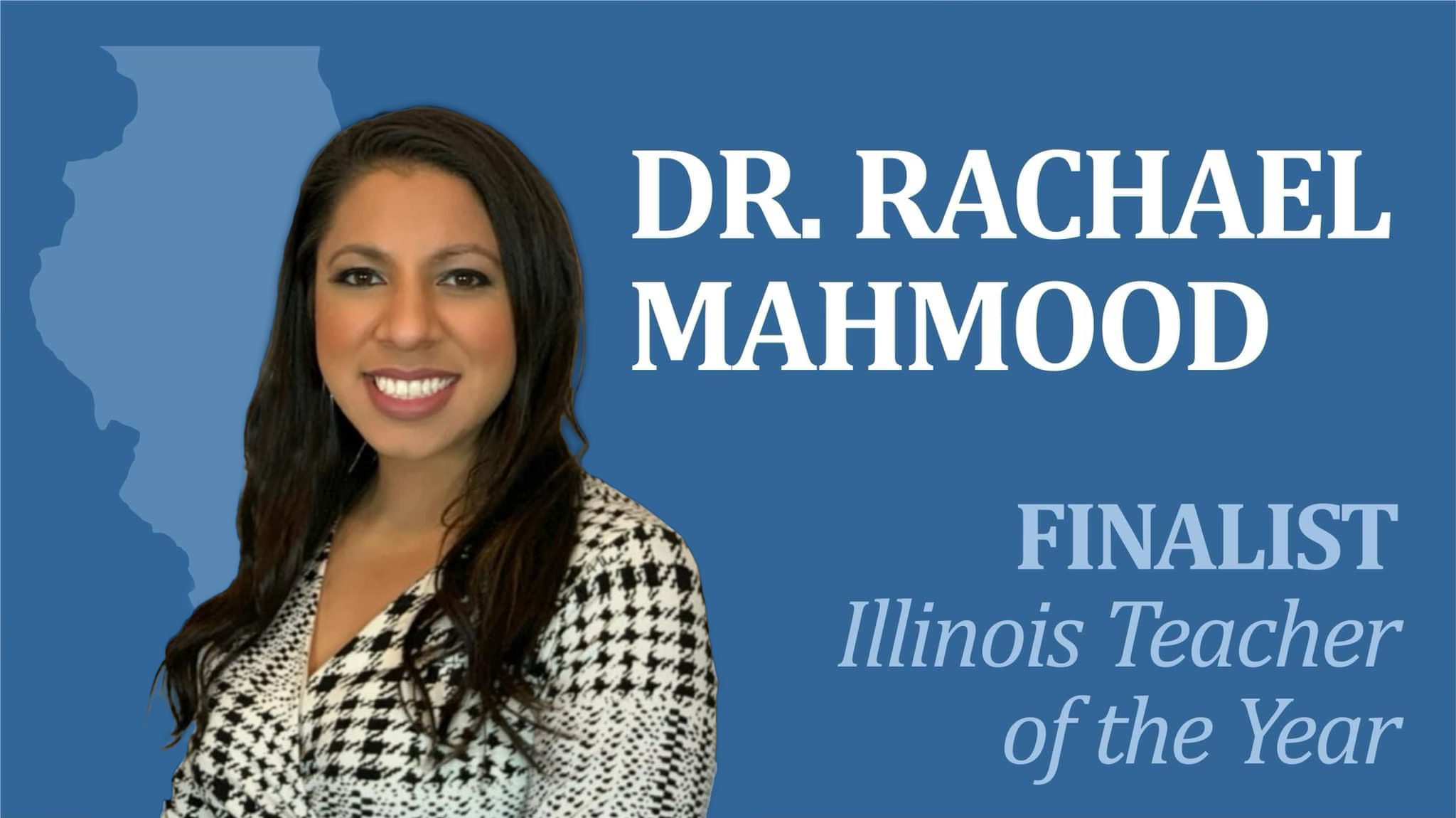Rachael Mahmood, Ed.D. '17, Creates Belonging With Culturally Relevant Instruction
By Lia Kizilbash Gillet

Growing up in the western suburbs of Chicago, Rachael Mahmood, Ed.D. ’17, felt racially and ethnically ambiguous.
“My full name is Dr. Rachael Loeb Batchu Mahmood,” she said as she introduced herself. “Every part of my name represents my identity. My mother is a Russian Jew. My father is an Indian Hindu. My parents are divorced, and both remarried to German Italian Catholics. My husband is a Pakistani Muslim.”
Mahmood loved her teachers growing up. She wanted to be a teacher but she never saw representations of herself in her classrooms or the curriculum. She says each year she learned an unintended lesson; that she didn’t belong.
“Sometimes the most well-intentioned people can teach you the most unintentional lessons,” she remarked. “I never felt like I belonged in school. With all the cultures, races, religions, and ethnicities I represent, I now realize that unifying these groups of people is where I belong. What I once thought was wrong with me was, in fact, right for me.”
Over time, Mahmood’s feelings shifted from not belonging anywhere to belonging everywhere.
Self-reflecting on why she was incredibly determined to be a teacher at such a young age, despite her family’s pressure to become a medical doctor, Mahmood believes her career ambitions were rooted in her emotional response to what was missing from her school experience.
“My dad always said, ‘Rachael, if you become a doctor, I will buy you a brand-new sports car,’ Mahmood recalled. “I would respond, ‘Daddy, I really want to be a teacher.’ My dad then would say, ‘Rachael, if you become a teacher, I will buy you a brand-new bicycle.’ I didn't get a car or a bike. But I did get an enriching career.”
She continued, “My career aspirations were almost a therapeutic response to missing that sense of belonging in school, with the hope to return to school to find the affirmations that I never received as a student.”
In college, Mahmood discovered her purpose. She received her undergraduate degree from Benedictine University and then her master’s from Elmhurst University. With the remaining goal of becoming a doctor, albeit not the doctor of her father’s dreams, Mahmood came to NIU for her Doctorate of Education.
“My aunt got her doctorate from NIU,” Mahmood shared. “She encouraged me to try a large public school and sold me on the benefits."
Mahmood heard about multicultural education during an educational psychology course and she was surprised to learn the concept had been around since the 60s.
"I questioned why my teachers hadn’t included my culture in the classroom or their lessons," she said. "I started to think, ‘if I had teachers who incorporated my culture, my identity, and my communication styles in the classroom, would it have changed the way I saw myself as a student?’”
Mahmood also learned about communal and oral cultures. She began to understand that many of her behaviors and characteristics as a student, like shouting out, high energy, drawn-out storytelling, and wandering around the room socializing, were hallmark behaviors of being from a communal culture. At this pivotal point, Mahmood vowed to “be a teacher who made every student feel included and empowered and who didn't see their culture as a challenge or a ‘problem’ but instead an asset.”
While at Benedictine, through a professor’s school district, she became involved in the Parent Diversity Advisory Council (PDAC) to help students achieve equity in curriculum and instruction. This experience led to an elementary school teacher opportunity, followed by teaching positions in fourth and fifth-grade classrooms. Later, she became co-chair of the PDAC in her district, presenting on diversity, equity and inclusion (DEI) topics and planning district-wide DEI-related events.
Today, recognized as the 2024 Far West Suburbs Region Illinois Teacher of the Year by the Illinois State Board of Education and an Illinois Teacher of the Year finalist, Mahmood enjoys learning about her students’ cultures and identities. She creatively incorporates them into various aspects of her lessons and centers her instructional engagement around them.
“I want my students to show up at school as their authentic selves,” Mahmood stated. “I love designing lessons that incorporate, celebrate and center students’ identities into my curriculum. Our educational system favors individualistic cultures, but there are small tweaks I make to affirm and include communal learning styles in my classroom.”
Mahmood also educates and supports teachers in applying practical methods to incorporate representation of their students’ identities in their classrooms. Through her consulting business, Equity Teacher Leader, Mahmood leads impactful conversations about culturally relevant instruction in the classroom.

“Every person has a culture, and a person's culture is a large part of their identity,” she said. “And your identity is the greatest strength you bring to school, your job, and your life experiences.”
Mahmood says that every person has aspects of their identity that lead to creating advantages—or disadvantages—in school. She makes two essential definition distinctions:
“Educational equity is simply the work we do to ensure that aspects of a person’s or community’s identity are not leading to disadvantages in school,” she said. “Culturally relevant instruction is a component of educational equity, which identifies ways students' identities are disadvantaged by our curriculum and instruction and addresses ways we can ensure success for all students from all different identities.”
Connecting others with their own disadvantages is often Mahmood’s first step in the conversation in her consulting practice.
“As soon as we recognize the aspects of our identity that disadvantage us, we are more likely to empathize with others who feel racial, ethnic, or cultural disadvantages,” she said. “As soon as someone feels seen, it’s easier for them to begin to see.”
Mahmood says teachers are already doing the work to get to know their students, and they go above and beyond to meet their needs.
“As teachers, we can do small things that can have a big impact,” she said. “Even small tweaks to what we are already doing can make a difference in the lives of students who feel marginalized, but we might not know it. Affirming students, connecting their identities to what they are learning, and celebrating their cultural identities empowers students to come to school as their authentic selves.”
In turn, students feel a sense of belonging that increases their classroom engagement and can have significant, life-changing outcomes. Mahmood has seen students who struggle with school, feel ashamed of their culture (or themselves), or mislabeled as the “problem child” shift their entire attitude and begin to flourish before her eyes after exposure to cultural relevance in her classroom.
“I’ve seen students go from floundering to flourishing before my eyes,” she said. “It’s the moment they have the epiphany that they are enough, which affirms my work.”
One student struggling academically came to Mahmood’s classroom. His family fled Chicago gangs and moved to the suburbs for a better life. He had a gift for building things, and Mahmood told him about engineers and shared free STEM programs with him. She told him, “You are an engineer.” not realizing that this single—and simple—affirmation would be a pivotal point for this student’s future.
Five years after he left her classroom, she received a note. It said, “Thank you for believing in me when no one else did. Thank you for telling me and my mom about STEM. Thank you for choosing me to build the electric car.”
Years later, Mahmood ran into the student’s mother. The mother said her son was in the Marines, training to be an electrical engineer, and Mahmood inspired him. Enveloped in the mother’s strong embrace, Mahmood was also inspired. She returned to her classroom and created an alumni wall, featuring graduates’ photos highlighting their careers. Above a mirror in the middle of the wall, it said, “…you will be next.”
“When you make decisions with students in your heart, center yourself on humanity, and create spaces where students can show up as their authentic selves, it’s more powerful than any big initiative,” Mahmood declared.
Mahmood’s heartfelt work has been recognized with awards including the Feldman Educational Leadership Award from Elmhurst University (2022), Rising Star Alumni Award from Benedictine University (2022), Distinguished Alumni Semi-Finalist from Elmhurst University (2021), Naperville Sun Teacher Feature from the Chicago Tribune (2020), and National Award for Teaching Excellence Semi-Finalist from Teaching Tolerance (2020).
Mahmood developed culturally responsive professional development sessions, served as her district's first equity ambassador, wrote articles, and shared simple ideas to help teachers make their classrooms more equitable and engaging for all learners. These efforts naturally led her to begin consulting.
“When people started reading my articles, they asked me to present at their schools and school districts,” she said. “That's when Equity Teacher Leader was born, and it serves as a vehicle to carry all the things I have learned from my classroom (which I fondly call my laboratory) and all the frameworks I designed for schools across Illinois.”
Mahmood learned that because of who she was, everything she needed to be a great teacher was already inside of her. She continues to teach fifth grade at Georgetown Elementary School in Aurora, Illinois, and aspires to write a book or two. She hopes to make a profound impact on education nationally in a way that increases belonging for all students.
But most of all, she says she wants to support others so they feel the same reward and fulfillment in their careers.
“You make hundreds of decisions every day as a teacher,” she said. “Each of these moments has the potential to become a defining one. Having a part in positively influencing my students’ futures is my most defining accomplishment. There is no better data to measure success than the hugs and smiles I receive, the emails from students (or their parents) years after they have left my classroom, and seeing my former students accomplish big things. When they say, ‘You were the teacher who made a difference for me,’ my heart explodes.”
